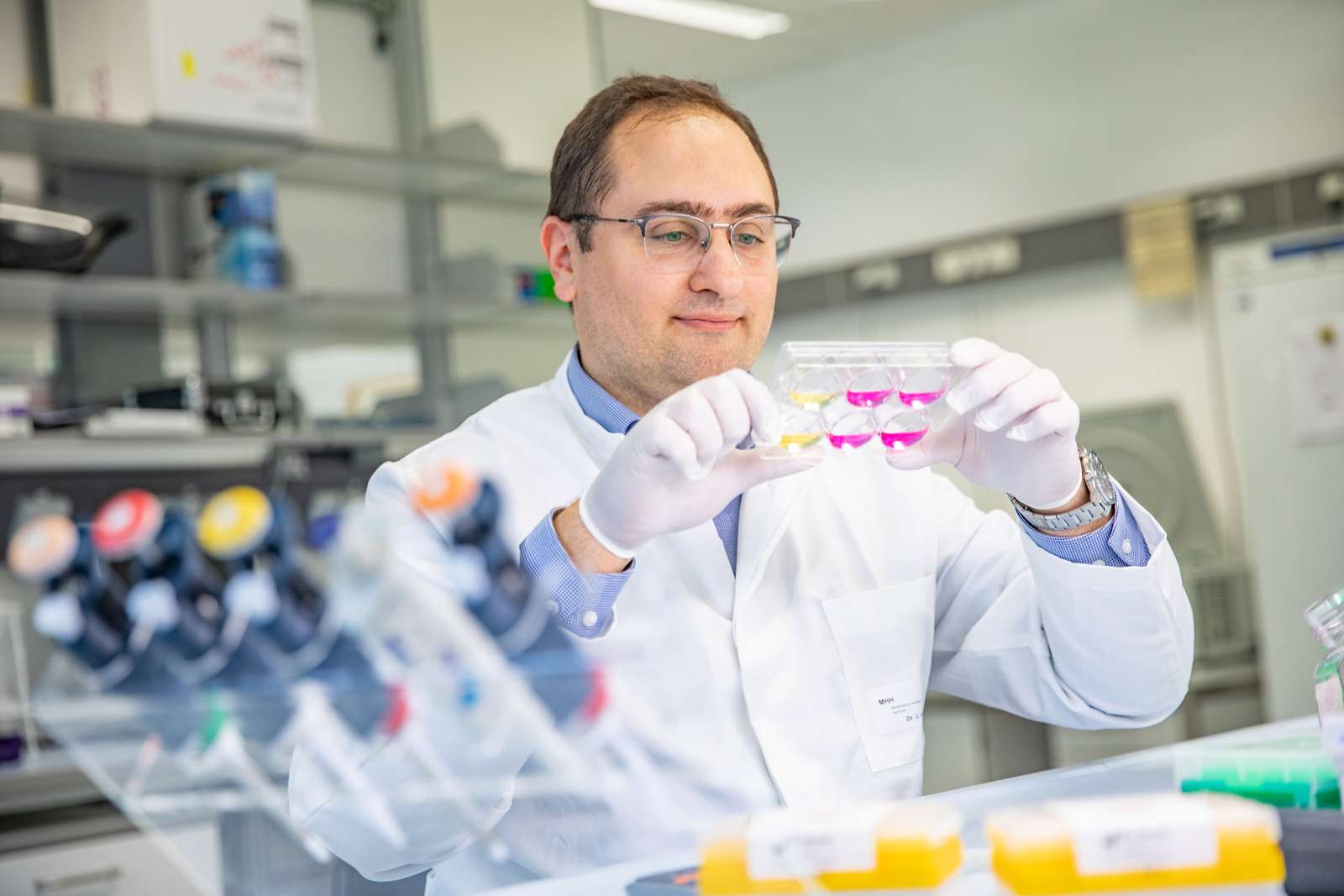A COFONI research project led by the MHH is investigating the role of mitochondria in heart muscle cells after SARS-CoV-2 infection.

Wants to find out how heart problems develop in post-COVID: Dr Georgios Amanakis. Copyright: Karin Kaiser / MHH
Already at the beginning of the Corona pandemic it became apparent: SARS-CoV-2 can not only damage the lungs, but also the heart and blood vessels. And even months after an infection, people suffer remarkably often from cardiovascular diseases such as heart attacks, strokes, cardiac insufficiency, heart rhythm disorders and heart muscle inflammation. However, it is not sufficiently known how the damage process actually takes place. A project led by the Hannover Medical School (MHH) is now addressing this question. A research team led by Dr Georgios Amanakis, assistant physician at the Department of Cardiology and Angiology under the direction of Professor Dr Johann Bauersachs, wants to elucidate the mechanisms by which the coronavirus influences the heart. "Some long- and post-COVID symptoms, such as shortness of breath, can probably be attributed to the heart," says the cardiologist. For the diagnosis and treatment of the syndrome, it is therefore urgently necessary to understand the cardiac pathophysiology, i.e. the course and physical processes in the heart during the disease, in more detail.
Malfunction of the power plants in heart muscle cells
The focus is on the so-called cardiac mitochondria. They are the "power plants" of the cells and produce 95 percent of the adenosine triphosphate (ATP) in the heart muscle, the most important energy currency in the body. If the mitochondria are impaired and cannot work properly, the heart muscle cells lack energy to pump enough blood, oxygen and nutrients into the body's cells. The malfunction is usually caused by oxidative stress. This is when too many free radicals accumulate, which can cause damage to cells or their functions. This metabolic condition has already been detected in the blood serum and white blood cells of Long-COVID sufferers. The researchers suspect that the dysfunction of the cellular power plants may also affect the virus defence. They now want to investigate the mechanisms in mouse heart tissue. The project is funded by the state of Lower Saxony within the framework of the COVID-19 Research Network Lower Saxony (COFONI) for two and a half years with more than half a million euros.
Signalling protein MAVS and interferon-alpha cascade control virus defence
In earlier work with other viruses that can also attack heart muscle cells, the researchers have already investigated how the cells defend themselves against the viral invaders. The tissue hormone interferon-alpha apparently plays an important role in this. It is controlled by the mitochondrial antiviral signalling protein (MAVS), which is essential for innate antiviral immunity and is located on the outer shell of the mitochondria. When viruses enter the cell, MAVS is activated and ensures that interferon-alpha is produced in the cell. The messenger substance prevents the viruses from reproducing. "We assume that this interferon-alpha cascade no longer functions in long and post-COVID patients," explains Dr Amanakis.
In the project, the researchers are now investigating how the mitochondria behave after an excessive immune defence, the so-called cytokine storm. For this purpose, they are using heart muscle cells from human induced pluripotent stem cells. These are "reprogrammed" body cells from adults that can give rise to any cell type in the human body - including heart muscle cells. These are then infected with the coronavirus. "We want to find out which proteins control interferon-alpha signalling in acute disease and in long- and post-COVID. They also want to clarify how acute corona infection causes heart muscle cells to die. "The upregulation of myocardial cell death during acute infection could possibly also influence the development of long and post-COVID," the cardiologist suspects.
Finding new treatment approaches
The researchers use a specially developed COFONI technology platform with which a COVID course can be generated that is similar and thus comparable to that of humans. The results should then explain in more detail which mechanisms the corona virus uses to weaken the viral defences of the heart muscle cells. "These data will then form the basis for developing new treatments against acute SARS-CoV-2 infection as well as long and post-COVID," Dr Amanakis hopes.
The project is taking place in cooperation with the University of Veterinary Medicine Hannover (Professor Dr Asisa Volz, Professor Dr Maren von Köckritz-Blickwede, Professor Dr Wolfgang Baumgärtner) and TWINCORE (Professor Dr Ulrich Kalinke), a joint facility of the MHH and the Helmholtz Centre for Infection Research (HZI).
Text: Kirsten Pötzke